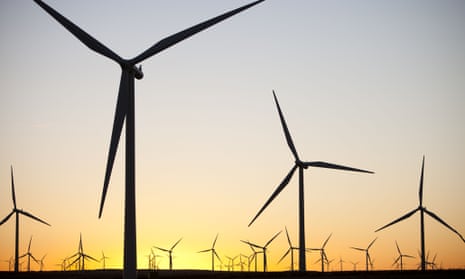The Scottish energy minister has called for an “adult discussion” with the UK government over the future of windfarm subsidies, after writing to Amber Rudd to express his concern that Scotland is being shut out of discussions.
In his letter to the secretary of state for energy and climate change, Fergus Ewing wrote: “We have not received any information from your department on the possible options you are considering or what analysis has been done to assess the impact on projects in Scotland.
“Given the importance of the renewables sector to Scotland and prior commitments to consult, I would appreciate your reassurance that you will not make any changes to the subsidy arrangements for onshore wind without agreement from Scottish ministers.”
On Monday, the Guardian reported that the Department of Energy and Climate Change was planning to announce that the existing subsidy scheme for onshore wind power will be closed a year earlier than it was due to, as the renewable energy industry warned the move could face legal challenge.
Asked about the issue at Thursday’s first minister’s questions, Nicola Sturgeon told the Holyrood chamber that it was “very concerning that changes are coming out in a piecemeal way via the media rather than with proper consultation with this government”. She urged the UK government “not to turn its back on this key industry”.
The letter continued: “Furthermore and given the obvious disquiet within the sector I strongly urge that your department engage with businesses involved in the sector and their trade bodies – both to give them reassurance that any changes to the subsidy regime are being taken forward in a considered and planned way, but also to ensure that your department retains good faith with these businesses and organisations who are integral to the future energy security of both the UK and Scotland.”
Speaking on Radio Scotland’s Good Morning Scotland programme on Thursday, Ewing insisted: “We are not seeking a row ... but we think there should be an adult discussion.
“We don’t know what [the UK government] are talking about because they haven’t made it clear at all and that is why many people in Scottish renewables are extremely worried that planned investment, and money sunk and spent may prove to be wasted and that exposes the British taxpayer to judicial review challenge in the courts.”
Ewing added: “With 71% support for onshore wind in Scotland and support for the Conservatives at 13%, green energy is five times more popular than blue politicians.”
The UK government pledged in last week’s Queen’s speech to consult with the devolved administrations on any changes to subsidies for onshore wind farms.
Lang Banks, director of WWF Scotland said the Scottish government was right to press for clarity. “Cutting support for the lowest cost renewable technology would be a backward step that will either see bills rise or climate targets missed.
“Opinion polls consistently show onshore wind to be one of the most popular forms of electricity, generating thousands of jobs across Scotland and helping to cut our carbon emissions.”
A Decc spokesperson said: “We’ve made it clear that we plan to consult the devolved administrations as we implement the manifesto commitment to end new public subsidy for onshore wind projects.”

Comments (…)
Sign in or create your Guardian account to join the discussion